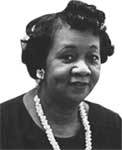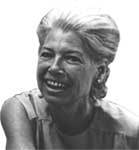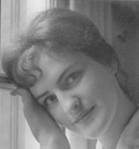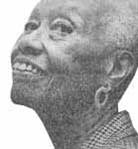Leadership
WIMS operated under the umbrella of the National Council of Negro Women. Dorothy Irene Height was president of the NCNW and a long-standing leader in the fight for racial and social justice and the protection of black women, children, and families. She was the lynchpin of WIMS. Polly Cowan was the WIMS executive director , as well as Height’s colleague and close friend. In 1964, Height and Cowan enlisted Doris Wilson and Susie Goodwillie to direct the project from the ground in Jackson, Mississippi.
 Dorothy Irene Height
Dorothy Irene Height
Born in 1912 in Richmond, Virginia, and growing up in Rankin, Pennsylvania, Dorothy Irene Height devoted her life to the causes of racial justice and women’s rights – especially the rights and needs of black women and their children. For years she held a series of leadership roles in the national YWCA. Simultaneously she worked for and then became president of the National Council of Negro Women. Height’s memoir Open Wide the Freedom Gates, was published by Public Affairs Books in 2003.
- National Women's History Museum: Dr. Dorothy I. Height A biography highlighting Height’s life and accomplishments.
- Read Holly Cowan Shulman’s tribute to Dorothy Height that appeared in the Huffington Post on April 22, 2010, following Height’s death.
 Polly Spiegel Cowan
Polly Spiegel Cowan
Born in 1913 in Kennilworth, Illinois, Pauline Spiegel Cowan became a radio and television producer and a political activist. Her most famous radio show, “Conversation,” brought together notable thinkers to discuss issues of the day. Her best known television show was “Down You Go,” a literary quiz show. In 1963 she went to work as a volunteer for the National Council of Negro Women, and by the time of her death was a member of the council’s board ofdDirectors. In 1939 she married Louis G. Cowan, who in the 1960s and 1970s worked hard to support WIMS, Height, and the NCNW. They had four children: Paul S. Cowan, L. Geoffrey Cowan, Holly Cowan Shulman, and Liza Cowan. Both Polly and Lou Cowan died in 1976.
- October 16 2002: Interview with Dorothy I. Height
Dorothy I. Height remembers how Polly Cowan first volunteered for the National Council of Negro Women in 1963. - ”Wednesdays in Mississippi” by Polly Cowan
In the fall of 1964 Cowan wrote an article describing WIMS and its goals for The Church Woman, the national magazine of Church Women United. - An Orphan in History, by Paul Cowan
Polly’s oldest son, Paul Cowan, wrote his memoir entitled An Orphan in History soon after Polly and Lou died together in a fire in 1976. In this excerpt he reflects on Polly and her work for the National Council of Negro Women.
 Susie Goodwillie
Susie Goodwillie
Born and raised in the suburbs of New York City, Susie Goodwillie went to Stanford University. Political activist Allard K. Lowenstein and Goodwillie’s experiences with Crossroads Africa inspired her to take part in the civil rights movement. Unlike most of her generation, Goodwillie began her activities through the women’s movement, and became the first white woman employed by the National Council of Negro Women. Goodwillie worked with WIMS throughout 1964 and 1965.
- Goodwillie’s official assignment in Jackson
Because Height and Cowan were afraid to reveal to the white Jackson community the real reason for Goodwillie’s sojourn there, they gave her a kind of alias. She was there, officially, to write a cookbook for Chilmark Press – a small publishing house located in New York City and owned by Louis G. Cowan. The joke that summer was that if you really wanted to publish a cookbook of Jackson recipes worth using, you would not go the white community; you would go the local black women.
 Doris Wilson
Doris Wilson
Born in Pittsburgh, Pennsylvania, and educated at Tuskeegee for her BA, Wilson held master’s degrees in Christian education from Union Theological Seminary and Columbia University jointly, and in social administration from Case Western Reserve. She worked in the student movement with the national student YWCA, in the southeastern region. She was director of the University YWCA at UCLA. After leaving WIMS and Mississippi in 1964, Wilson moved to Chicago to become director of race relations at the Metropolitan YWCA, and from there moved up the administrative ladder. She retired in 1977 from the YWCA and did a variety of other work in the Windy City, including literacy training. In 1983 she returned to Pittsburgh, where she still lived until her death in 2008.
- October 16 2002; Interview with Dorothy I. Height
Doris Wilson had known Height for many years through the YWCA. When it came time to choose an experienced leader to take care of the black WIMS women visiting Jackson, Height tapped Wilson for the job. Wilson agreed to take it on. Height recalled, “Then we needed an experienced person in the black community. Well, Doris Wilson had a lot of experience in the YWCA and was at the Chicago YWCA. I said, ‘Well, let me try Doris.” She said she was interested. So that gave us the staffing.” - Susie Goodwillie Remembers Doris Wilson
Wilson and Goodwillie worked together in Jackson during the summer of 1964, and yet racial barriers kept them apart just like southern women.